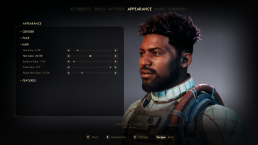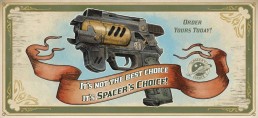Even after the big disappointment called Fallout 76, Bethesda does not seem to be willing to make a new single player game in the franchise. Fortunately, New Vegas developer Obsidian is and they are coming with The Outer Worlds.
This game knows how to merge shooters and RPGs. You’ll have the choice to tackle situations in multiple ways, so that you can get through the game shooting, hacking or bluffing.
This spiritual successor takes place in space in a colony that spans several planets, but this sci-fi setting is also full of the 1950s references. Radios play old-fashioned music in villages with the same old-fashioned neon lighting. And those villages try to shape their own society in a crazy way.

In The Outer Worlds you play a settler who was frozen years ago so that he could travel to a far-away galaxy on a spaceship. However, due to complications, your ship was pushed off course and you never arrived. When a mysterious scientist brings you to life, he sends you on an adventure to get the space colony back on the right path and reduce the grip of mega companies.
You can fully determine how you do that. At the start of the game you put together your own character with specializations, which you can do more and more as you grow in level. For example, you can choose to shoot through the game, try to sneak, or hack hackers to do the heavy work for you. Invest enough in your speaking skills and you can lie, intimidate and seduce to ensure that everything works out well.

Those choices are not new in role-playing, but there are few games that give you as much freedom as The Outer Worlds. Almost every mission in the game has several ways you can complete it, where you can also choose from multiple endings with different results. For example, do you choose to return a stolen blueprint of an experimental weapon to the designer?
The impact of your choices feels concrete. For example, if you sell the above weapon, it creates prestige at a local Mafioso – which in turn helps you with a completely different mission. You never have to choose, which extraterrestrial race will save you from ruin, but the smaller effects make the universe feel alive. Every NPC sees what you do and takes that into account during dialogues. Dialogues which are all very well voice acted and story telling.
This can even be seen in the smallest dialogues. If you shoot a bandit at the start of the game and steal his clothes because the stats are simply better, villagers feel uncomfortable when you talk to them. After all, you are dressed like the same person who has been terrorizing their friends and family for years. You are immediately faced with a choice: do you abuse that fear to get your way, or do you reassure the villagers?
And such examples are numerous in The Outer Worlds. Both in the main storyline and in the many side missions. It gives the impression that you are really influencing the world and not simply walking the path made by the gamemaker.
All of this is supported by strong writing. Although the world of The Outer Worlds is clearly inspired by Fallout, the game tackles a number of themes that are responded to perfectly. Just like in many science fiction, the galaxy is ruled by mega corporations, but in The Outer Worlds that is food for satire.
Personnel employed by Spacer’s Choice, for example, are obliged to end every conversation with a company slogan, regardless of the situation. In addition, their contracts are full of clauses that make life difficult for them. Wages are deducted preventively to pay for the future graves of staff, or to cover the costs of a suicide. According to the company, a suicide is nothing less than “damaging company property”.


Although this is strictly a role play, you primarily fight by shooting the old-fashioned way. For the most part, that works great: you aim your weapons and shoot, just like in any modern shooter. Even with heavier weapons a sense of impact is missing.
You can also delay time with the press of a shoulder button. If you stand still it can be done for a long time, but as soon as you move or shoot, a meter starts running. If that meter is empty, you have to wait until you can do this again. At the start of the game you are barely allowed to use it, but as you level and invest in new skills you can extend its use and return it more often.
Fighting certainly feels a bit frustrating at the start of the game. One enemy can attack you dozens of times without having a major impact, while the other can hit you in two shots. That while the game does not clearly show the difference in power between the two. It forces you to be careful, but I regularly felt that I was reaching my end unfairly.
As soon as you reach a higher level, fights become more interesting. You get access to new skills that, in the long run, compliment your carefully chosen weapon arsenal. However, the shooting area never feels impressive enough to support the rest of the game.
I can happily forgive The Outer Worlds. The value of this game is not because of the crashing of opponents, but in the gigantic freedom of choice that you have. In the fact that you can shoot down a wanted criminal, but you can also make a pact with him to take back the police. This is a game that always surprises you with unexpected possibilities.
Score:
9,0
– Often long loading times
– Weapons lack impact
+ Visualy stunning worlds
+ Creative writing
+ A lot of freedom